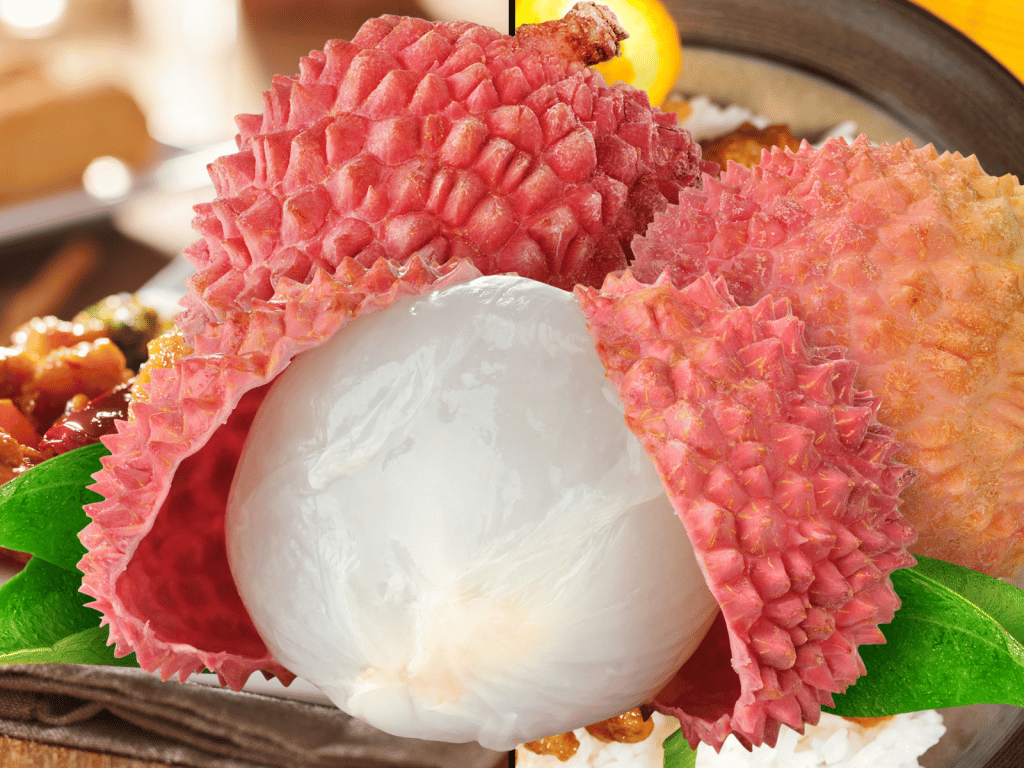Despite the fact that dogs are natural carnivores, adding certain fruits and vegetables can be beneficial. It can provide nutrients they won’t get any other way, and it can add valuable variety to their diets. So, what about lychee fruit? Can dogs eat lychee? Yes, they can! But there are some very important things to know, do, and keep in mind if you choose to add lychee to your dog’s diet.
Can Dogs Eat Lychee?
Lychee is a high-fiber, low (relatively) carb fruit that is rich in vitamins. It is especially low in calories for a fruit, making it a potentially good choice when it comes to adding fruit to a dog’s diet. In addition to its high nutrient density, it is also a natural diuretic as well as a good source of protein. But is this unusual fruit safe for dogs to eat?
Some fruits and vegetables are good for dogs. Some are okay, and some are dangerous. Lychee can be somewhere in the middle, but with the right food prep and portion sizes, you can safely feed lychee to your dog.
Is Lychee Fruit Safe for Dogs?

After prepping the lychee fruit properly, dogs can have it. But it is not something that you should give them more than once a week. At most, you can give it to them as an occasional snack.
The most dangerous part of the lychee fruit is the seed or pit. This is a large, brown seed that should be removed before feeding the fruit to your dog. The seed contains toxins that will cause intestinal distress, or worse. They are also a choking hazard for dogs and humans.
The lychee fruit can be toxic to dogs, and even to humans if it is eaten before it becomes fully ripe. In 2014, hundreds of East Indian children died from eating a shipment of unripened lychee fruit. A few years later, researchers managed to isolate the amino acid responsible for the tragedy.
This dangerous compound only occurs in toxic proportions when the fruit of not yet ripe. As it ripens, microbes consume the amino acid, making the fruit safe to eat. If this puts you off enough to avoid the fruit completely, we understand completely. However, just keep in mind that there are no known deaths or injuries associated with lychee fruit eaten after it becomes ripe.
Any known exceptions will involve choking on the large seed the fruit contains. If your dog has eaten unripe lychee, please scroll down immediately for advice.
The Benefits of Lychee Fruit for Dogs
Like any fruit or vegetable, there are precautions to follow before feeding your dog lychee. We have talked about those precautions, and it would be a good idea to review those recommendations before giving the fruit to your dog.
Now, that having been said, there are dietary benefits of this fruit for canines. The first benefit is dietary fiber. This helps build good microbes in the gut and acts as a scouring agent to keep the intestines clean and regular.
While lychee, like all fruit, has sugar levels that are generally higher than is recommended for dogs, it has low sugar content compared to most fruit. This makes them a good choice in the fruit category.
| Nutrient | Amount | Percent of Daily Recommended Allowance |
|---|---|---|
| Folates | 14 µg | 3.5% |
| Niacin | 0.603 mg | 3.5% |
| Choline | 7.1 mg | 1% |
| Pyridoxine | 0.100 mg | 9% |
| Riboflavin | 0.065 mg | 5% |
| Thiamin | 0.011 mg | 1% |
| Vitamin C | 71.5 mg | 119% |
| Vitamin E | 0.07 mg | 0.5% |
| Vitamin K | 0.4 µg | 0.3% |
Feeding your dog more than one serving of fruit per week does come with an increased risk of canine diabetes and other conditions. The total portion size should be between 5 and 10% of your dog’s total daily intake.
What About Lychee Seeds and Skins?
While we have mentioned the danger of the lychee seed, it bears repeating that it is both toxic and a choking hazard for dogs. The skin, like the skin of most fruits and vegetables, should be removed. Skins of many fruits and vegetables contain natural and unnatural pesticides that are hazardous to dogs.
If your dog likes lychee, be careful to seal up the skin and seeds when you throw them away. Do not just drop them in the trash if your dog craves the fruit. Otherwise, your dog is likely to raid the trash and make himself sick.
What to do If Your Dog Has Eaten Unripe Lychee
If your dog has eaten unripe lychee you should contact your veterinarian as soon as possible. If your vet is unavailable, take your dog to an emergency veterinarian.
Watch for:
Immediate danger signs
- Drooling
- Head shaking
- Seizures
- Muscle spasms
If you see any of these signs, contact an emergency vet right away.
Long-term danger signs
- Dark urine
- Weight loss
If you see any of these signs, get your dog to your regular veterinarian for long term intervention.



